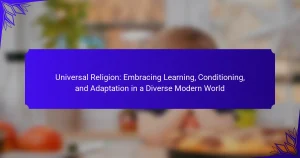Changing your thoughts can lead to profound transformations in your life. This article explores mastering learning and conditioning, emphasizing cognitive restructuring, emotional intelligence, and resilience. It discusses strategies for effective habit formation, the importance of self-awareness, and common pitfalls to avoid. By embracing a growth mindset, individuals can achieve lasting personal development and improved decision-making.

How Can Changing Your Thoughts Lead to Life Transformation?
Changing your thoughts can significantly transform your life by reshaping your beliefs and behaviors. This mental shift allows for new opportunities and perspectives. By mastering learning and conditioning, individuals can create lasting changes in their mindset. Cognitive restructuring, a technique that challenges negative thought patterns, plays a crucial role in this process. As a result, individuals can experience improved emotional well-being and greater resilience in facing life’s challenges. Embracing a growth mindset fosters adaptability and encourages continuous personal development, ultimately leading to a more fulfilling life.
What Are the Core Principles of Learning and Conditioning?
The core principles of learning and conditioning involve understanding how thoughts influence behavior and emotional responses. Key principles include reinforcement, which strengthens desired behaviors; punishment, which discourages undesired behaviors; and the concept of cognitive restructuring, which emphasizes changing thought patterns for improved outcomes. These principles facilitate lasting transformation by promoting adaptive learning strategies and enhancing self-awareness.
How Do Modern Techniques Enhance Learning and Conditioning?
Modern techniques enhance learning and conditioning by integrating technology and neuroscience. These methods personalize education, making it more effective. For instance, adaptive learning platforms adjust content based on individual progress, ensuring tailored experiences. Additionally, techniques like gamification increase engagement, motivating learners through rewards and challenges. Neurofeedback training helps individuals regulate their brain activity, promoting focus and retention. Overall, these advancements create lasting transformations in how we learn and condition our behaviors.

What Universal Benefits Does Mastering Learning and Conditioning Provide?
Mastering learning and conditioning provides transformative benefits that enhance personal growth and mental resilience. These benefits include improved self-awareness, increased motivation, and effective habit formation. By changing thought patterns, individuals can achieve lasting transformation in their lives. Additionally, mastering these skills fosters emotional regulation and better decision-making. This holistic approach empowers individuals to overcome challenges and pursue their goals with confidence.
How Can Improved Mindset Affect Daily Life?
Improved mindset significantly enhances daily life by fostering resilience, creativity, and productivity. A positive mindset leads to better stress management and healthier relationships. Research shows that individuals with a growth mindset are more likely to embrace challenges and persist through difficulties, resulting in personal and professional growth. Additionally, a shift in thought patterns can improve emotional well-being, reducing anxiety and depression. This transformation often manifests through increased motivation, goal achievement, and overall life satisfaction.
What Role Does Emotional Intelligence Play in Transformation?
Emotional intelligence is crucial for transformation as it enhances self-awareness and interpersonal skills. It allows individuals to manage their emotions effectively, fostering resilience during change. High emotional intelligence promotes adaptability, enabling better responses to challenges. This adaptability is a unique attribute that significantly influences lasting transformation. As a result, individuals with strong emotional intelligence are more likely to achieve their goals and maintain positive relationships throughout their journey.

What Unique Strategies Facilitate Lasting Change?
Transformative change is facilitated by unique strategies that focus on mindset shifts and consistent practice. Emphasizing self-awareness and cognitive restructuring can lead to profound personal growth. Techniques such as visualization and affirmations reinforce positive thinking patterns. Additionally, incremental goal setting provides measurable progress, enhancing motivation. Engaging in reflective practices fosters deeper understanding and adaptability. These strategies create a sustainable framework for lasting transformation.
How Can Cognitive Behavioral Techniques Be Applied?
Cognitive behavioral techniques can be applied by restructuring negative thought patterns to facilitate positive change. These techniques include cognitive restructuring, behavioral activation, and exposure therapy. Cognitive restructuring helps identify and challenge distorted thoughts, promoting healthier thinking. Behavioral activation encourages engagement in enjoyable activities to combat depression. Exposure therapy gradually confronts fears, reducing anxiety over time. Each method fosters lasting transformation by altering thought processes and behaviors.
What Steps Are Involved in Cognitive Restructuring?
Cognitive restructuring involves several key steps to effectively change thought patterns. First, identify negative thoughts that contribute to emotional distress. Next, challenge these thoughts by examining evidence for and against them. Then, replace negative thoughts with more balanced and realistic ones. Finally, practice these new thoughts regularly to reinforce positive change.
What Innovative Tools Support Personal Growth?
Innovative tools for personal growth include mindfulness apps, cognitive behavioral therapy (CBT) software, and online learning platforms. These tools facilitate lasting transformation by promoting awareness, reshaping thoughts, and enhancing skills. Mindfulness apps, like Headspace, encourage present-moment awareness, reducing stress and fostering positive thinking. CBT software, such as MoodKit, helps users identify and change negative thought patterns. Online learning platforms, like Coursera, provide access to diverse courses that cultivate new skills and perspectives. Each tool supports the process of mastering learning and conditioning for personal development.
Which Apps Are Most Effective for Learning and Conditioning?
The most effective apps for learning and conditioning include Headspace, Duolingo, and Elevate. These applications provide tailored content and interactive features that enhance cognitive skills and promote positive habit formation.
Headspace offers guided meditation and mindfulness practices, helping users improve focus and reduce stress. Duolingo uses gamification to teach languages, making learning engaging and accessible. Elevate focuses on brain training through personalized exercises that target reading, writing, and math skills.
These apps leverage unique attributes such as user-friendly interfaces and adaptive learning techniques to maximize user engagement and retention. They contribute to lasting transformation by fostering a consistent learning environment.

What Rare Attributes Contribute to Successful Transformation?
Rare attributes that contribute to successful transformation include resilience, adaptability, and emotional intelligence. Resilience enables individuals to overcome setbacks, while adaptability allows for flexibility in changing circumstances. Emotional intelligence fosters self-awareness and better interpersonal relationships, essential for navigating transformations. Cultivating these attributes enhances the capacity for lasting change and personal growth.
How Does Neuroplasticity Influence Learning?
Neuroplasticity significantly enhances learning by enabling the brain to reorganize itself through experience. This adaptability allows individuals to develop new skills and modify behaviors effectively. As a result, consistent practice and positive thinking can lead to lasting transformation in one’s life. Neuroplasticity facilitates the formation of new neural connections, which is crucial for mastering learning and conditioning. Engaging in activities that challenge the brain can further promote this plasticity, reinforcing the idea that changing thoughts can lead to profound changes in life outcomes.
What Are the Uncommon Practices of Highly Successful Individuals?
Highly successful individuals often engage in uncommon practices that transform their lives. They prioritize self-reflection, enabling them to learn from experiences and adapt their mindset. Another practice is setting unconventional goals, pushing boundaries beyond traditional metrics of success. Additionally, they cultivate a growth mindset, viewing challenges as opportunities for development. They also practice gratitude regularly, fostering resilience and positivity, which enhances overall well-being.

What Are the Common Mistakes in Learning and Conditioning?
Common mistakes in learning and conditioning include a lack of clear goals, inconsistent practice, and neglecting feedback. Setting specific, measurable objectives enhances focus and motivation. Regular practice reinforces skills, while feedback provides essential insights for improvement. Additionally, over-reliance on rote memorization can hinder deeper understanding. Emphasizing critical thinking and application of knowledge leads to more effective learning outcomes.
How Can You Avoid Pitfalls in Personal Development?
To avoid pitfalls in personal development, focus on cultivating a positive mindset and embracing lifelong learning. Identify negative thought patterns and replace them with constructive beliefs. Engage in consistent self-reflection to assess progress and adjust strategies. Build a supportive network that encourages growth and accountability. Prioritize setting realistic goals to maintain motivation and avoid overwhelm.

What Expert Insights Can Accelerate Your Transformation Journey?
To accelerate your transformation journey, embrace the power of mindset shifts. Mastering learning and conditioning techniques can lead to profound changes in behavior and perspective. Expert insights emphasize the importance of consistent practice and self-reflection in this process. For instance, adopting a growth mindset fosters resilience and adaptability, essential for lasting transformation.
What Best Practices Should You Implement Today?
To transform your life effectively, implement these best practices today. Focus on cultivating a growth mindset, embracing challenges, and learning from failures. Regularly practice self-reflection to identify areas for improvement. Establish clear goals and break them into manageable steps to maintain motivation. Engage in continuous learning through reading, courses, or mentorship to expand your knowledge base. Prioritize mindfulness and stress management techniques to enhance emotional resilience.


